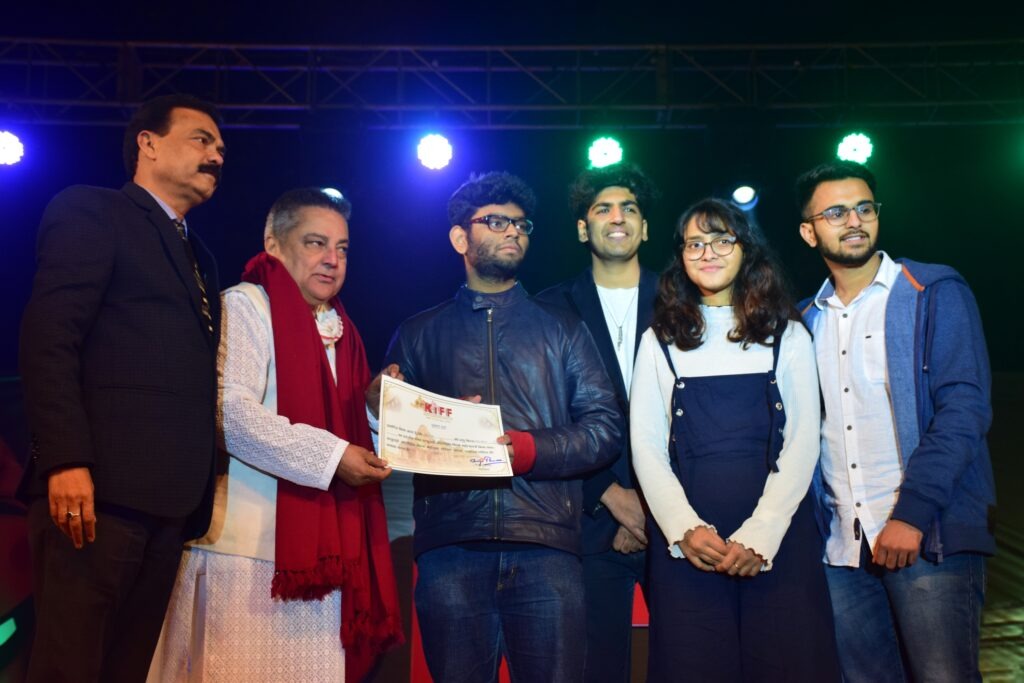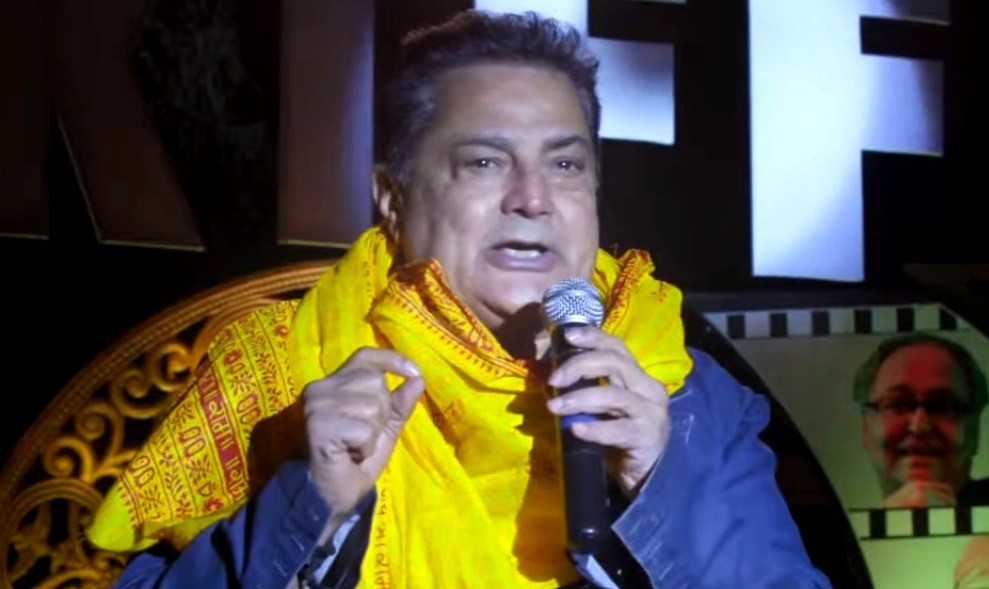INDIA. Khajuraho: The 6th edition of the Khajurahu Internarnational Film Festival (KIFF) is currently underway in the tourism hub of Madhya Pradesh. KIFF 2020 is being organized offline as well as online owing to COVID-19 guidelines. The weeklong festival will run from 17-23 December, 2020 in Khajuraho.
In this interview, actor-turned-politician Raja Bundela, the founder and chairperson of KIFF, talks about the challenges of organizing the film festival during COVID-19 times, the key attractions this year, the concept of setting up tapra (tent) talkies in remote places, and his commitment to take Bundelkhandi cinema to global audiences.
Excerpts
Q1. This year most of the major film festivals in the world globally, including Cannes, suffered setbacks owing to the ongoing pandemic. What gave you the courage to go ahead with the 6th edition of KIFF as per schedule?
A. I have commitment towards the people of Khajuraho. They have no theatres in the radius of 60-70 kms and so they eagerly wait for the festival every year. I just didn’t want to deprive them of entertainment. We are following all the government guidelines for COVID-19. Khajuraho has fortunately been a green zone and so are able to go ahead with the festival despite the COVID-19 pandemic. We have 40 percent of our lineup happening in the virtual mode for this very purpose. Every tapra talkie will have a santizer gate and we will be providing masks. Wearing masks is compulsory. You can either bring yours or else we will provide you with the same. Also, social distancing is in place and that’s why we have increased the number of tapra talkies to 12. We will also be playing PSAs in between the screenings to spread awareness about COVID-19.
Q2. You said that 40 percent of the festival lineup is happening in the virtual mode. Could you please elaborate on your plan of action?
A. KIFF 2020 is being organized offline as well as online owing to COVID-19 guidelines with 40 percent of the festival lineup happening in the virtual mode. As already stated, we have increased the number of tapra (tent) talkies to 12 this year. Also, we have engaged 20 mobile vans for screening films in remote villages. Each of the mobile vans will show only one movie per village so that we can maximize the coverage and so every day we plan to cover 100 villages through these 20 vans. That’s 700 villages in 7 days.
KIFF is known for its colorful cultural evenings which traditionally attract huge crowds. This year the focus will be on folk but the evening programmes will take place in an online format to avoid big gatherings. We have shifted our evening lineup to an online format this year. Every evening from 7 to 10 PM you can watch the lineup from the comfort of your home. For the same we have partnered with SKY 9, an online video streaming Over The Top (OTT) platform, which will simultaneously take us to over 100 countries. So, you just need to download the app to enjoy it.
Q3. What are the key attractions this year at the Khajuraho International Film Festival?
A. This year the festival’s major highlight will be a segment titled “Tumko Na Bhool Payenge” focused around paying a tribute to the legendary personalities of world cinema whom we lost this year such Sean Connery, Soumitra Chatterjee, Jagdeep, S. P. Balasubrahmanyam, Saroj Khan, Rishi Kapoor, Irrfan Khan, Nishikant Kamat, and Sushant Singh Rajput, among others.
Then we also have a special segment aimed at spreading awareness about child trafficking. There is a big concern in the country as well as in the state over the issue of child trafficking. After drugs and arms, this is the biggest crime globally. So we have a whole segment on the issue of child trafficking wherein we will be screening films and hosting discussions around it. Places like Mandla and Bastar in Madhya Pradesh are the worst hit. Girls are most prone to it. They are picked up by the traffickers at a very young age and sold out and over the next 10-15 years their names are changed so many times that it becomes impossible for the government to trace them as these girls lose their identity in the process. We basically want to grow awareness about child trafficking through this new segment.
Also, KIFF 2020 will be putting spotlight on the Bundelkhandi heritage. There will be a strong emphasis on promoting local art and craft, food, costume and culture at large. Ever wondered from where the stones for the world famous temples in Khajuraho came from? For, there are no natural stone sites near Khajuraho. An NGO called Bundeli Virasat has done extensive research and found out that these stone used to be brought by waterways and then subsequently were moved to the temple sites. The NGO has come on board on a voluntarily basis. Also, there is art work by Ashok Shrivastav who has created an entire art culture from the roots of the trees that fall in the forest. Since this year owing to COVID-19 foreign guests aren’t visiting Khajuraho and so we have decided to make the tourist guides as brand ambassadors of KIFF.
Q4. Over the years you have been trying very hard to put spotlight on Bundelkhandi cinema. What can we expect this year?
A. Every year we show Bundelkhandi films in tapra talkies but despite our best efforts we haven’t been able to ensure distribution rights for these local films. But this year we are trying something new. I am so happy that we have reached to this point. For this also we have tied up with SKY 9. I told them that if you can dub Spanish, French or Japanese films and present it to a global audience then you can do the same with Bundelkhandi films which have their own flavor. Along with tapra talkies we will have these stalls where their films (short films, feature, and documentaries) will be watched and procured based on the terms and stipulations mutually agreed upon. KIFF has nothing to do with that of course. You see, it’s between the buyer and the seller. We are just providing them a window. It’s a commitment from our side to the storytellers in Bundelkhand. That there will be a buyer for your film at your door. This will hopefully help them reach a wider audience, nationally as well as internationally. I am really delighted that we have reached a point where we are able to making this possible for local filmmakers.
Q5. Tell us about the different kinds of knowledge sessions that you have lined up this year.
A. Just like every year, the 6th KIFF will host masterclasses, workshops, and discussions on various subjects. This year we have invited acting students from Madhya Pradesh’s School of Drama. The likes of Piyush Mishra, Shakti Kapoor, Anup Jalota, Pankaj Dheer, Ronit Roy are scheduled to visit the festival this year and so these young actors will have a healthy interaction with these veterans over the course of the week.
One of the major masterclasses will focus on Intellectual Property Rights (IPR) pertaining cinema. Also, in another very important session, Anita Sinha will conduct a masterclass on sound. Then Sushmita Mukerjee would be hosting ‘In Conversation’ sessions with the various celebrities attending the festival.
Q6. KIFF has entered in 6th year and each year it has grown bigger in terms of reach and scope. Tell us the vision behind the festival.
A. Bundelkhand is the place of my birth and I think I owe it the people of the region. I got associated with the movement demanding creation of a separate Bundelkhand state, back in the year 1995. Subsequently, I started exploring various ways of promoting welfare in the region. Now, I have gained a lot through my long association with film, theatre and cinema. So, I thought of leveraging upon it for the benefit of the people in the region. For as far as I can remember, Khajuraho had been on my mind and so I thought of setting up a film festival in Khajuraho, for the place is already known globally for its rich cultural heritage. The idea was fully backed by my wife and fellow actor Sushmita Mukherjee who is also from NSD. Now, the authorities wanted it to be hosted it in one of the big cities in MP, but I was totally convinced that it had to be done in Khajuraho only.

Q7. How did you come up with the idea of setting up tapra talkies as part of KIFF?
A. Well, during the first year of KIFF we began by having film screenings in halls and lounges of some of the leading hotels in Khajuraho. Now, the cultural evenings we had were really successful. But we hardly got any audiences during the film screenings. It was a big disappointment. So we did a survey in the villages. We learned that they were getting intimidated by these big hotels. It was a huge challenge to overcome the problem before the second edition. It seemed impossible to set up theatres in such a less time. Then I was reminded of the touring talkies that would come during our childhood days. They would set up tents and screen movies to the village people. So that’s how I decided to set up tapra talkies. The idea really took off. Our very first show was a sold out even though we were screening an American film as the US was our partner that year. By the third year we had 4 tapra talkies up and running. In the fourth we had as many as 8. It was really unbelievable but we did make it happen. I have always seen cinema as a powerful medium of reaching out to the people. So it’s important to make people literate towards cinema. When noted film personalities visit Khajuraho it brings the entire region in the limelight. Also, it inspires the local people and creates opportunities for them. Last year over 10,000 people visited the festival. Now, we have also succeeded in providing a platform to local filmmakers to find buyers for their films. So we have really come a far way but it’s still a long way to go. We are certainly on the right track.




Comments are closed.